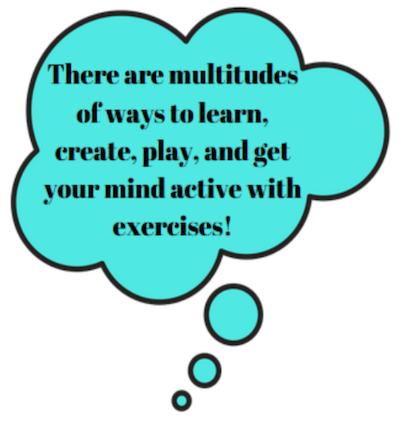Your Brain Needs Exercise Too! (READ MORE..)
Finding a Relationship Between Brain/Body Exercise
Currently, people are dealing with an overabundance in stress levels…
and lack of sleep. The effects of the current global pandemic are enough to create a vicious cycle which can cause off-kilter lifestyles, leading to depression, anxiety, and other stress-induced reactions on the mind and body. Because of these overwhelmingly difficult days, it is vital to keep a regiment going of exercises and nutrition to feed your entire body for optimal health. Exercising the brain and body, bathes the overall wellness for your orthomolecular environment, and reduces possible chances of being consumed by deficiencies that are inclined to wear you down bit-by-bit.
Orthomolecular Environment
Dr. Linus Pauling, and Dr. Hoffer originators, researchers, and specialists in defining and researching optimum molecular environments (the best condition our body/mind can consist at one time), have found the whole body benefits and is at "optimum" levels of functioning when the body is both nutritionally and mentally balanced (Jeffrey Bland, PHD, 2002). This is not a new theory, and in fact has dated back over 2,000 years. We know that "a healthy mind lives in a healthy body" but what types of exercises should we be doing, both mentally and physically to attain this natural balanced state?
What are Executive Functions?
On top of a physical routine, individuals should also integrate a form of brain exercise into their daily lives. Keeping the mind functioning at optimal levels, can help with "Executive Functions" or EF's. These EF's enable the mind to process information, and find alternative connections while learning new roles (neuroplasticity). Essentially, this means, as we learn something new, we form new connections and we have better abilities to function, create gray matter (self-control/muscle control/sensory), and have stronger synapses between neural networks at a cellular level.
Physical Exercise
The optimum forms of exercise are not always "one-size fits all" and in fact, it should be discussed with your health care professionals while figuring out your nutritional plan. However, an integration of low-intensity mind/body exercise such as yoga or tai chi along with resistance training (weights) dramatically increase a positive relationship in cognitive processing and an "increased capacity of the heart, lungs, and blood to transport oxygen." (Harvard Health, 2020). Additionally, even walking 30-minutes a day has significant wellness impacts in both brain processing and physical attributes.
Brain Exercises & Building Stronger Executive Functions
Just as physical exercise can build an optimum physique, to create an optimum molecular environment for the body we also need to encompass brain building activities. "The mind runs parallel with physiological processes within the brain." (Kenyon, 2020) Activities that accelerate the cognitive function of our brain in conjunction with building effective EF's, have been linked to the following:
Meditation (Promotes whole brain thinking)
Testing Recall
Music (Music is healing)
Use Your SensesPlay (play a sport, do a puzzle, do trivia, etc...)
Using Executive Functions
Executive functions can be used daily and in a multitude of ways. Thinking outside the box at work, or keeping your cool after being cut-off on the highway. These are just two ways in which executive functions can help process information and enable the mind/body to react. Executive functions (EFs; also called executive control or cognitive control) refer to mental processes needed when you have to concentrate and pay attention (NCBI, 2012). Without inhibitory control we would be at the mercy of impulses, old habits of thought or action (conditioned responses), and/or stimuli in the environment which pull us in all different directions (NCBI, 2012). Essentially, researchers, neuroscience, and psychologists have described the core executive functions as:
Inhibition (Self-control)
Working Memory (Planning)
Interference Control (Ability to tune out stimuli, focus on tasks)
Cognitive Flexibility (Adapting to changes, circumstances, and understanding different perspectives)
Food for Thought
Some food for thought, literally, is by using nutrition as another form of "exercising" your brain. While each person's nutritional needs are different and should be addressed individually, seeking out those optimal molecular environments, here are some general rules to follow:
Eat organic, locally grown, and in season
Discuss with your health care professional a balance of vitamins including Omega 3 and 6.
Nutrition affects cognitive processes & emotions (think about what you are consuming)
Fermented foods rich in probiotics can assist in maintaining mind/gut relationship
It is not too far off to say, relationships take work. Balance is something which is different for every person. Balancing life, exercise, and mind activities is also something that will take dedication, and effort, however, the benefits are long-term and essential. Finding a practice that works-out the body and mind can have lasting effects on all individuals, young and old!
References:
Harvard Health Publishing. (2020). What kinds of exercise are good for brain health?. Retrieved from http://What kinds of exercise are good for brain health?Jeffrey Bland, PHD. (2002). Creating the Deeply Personal Science of Your Health. Retrieved from https://jeffreybland.com/knowledgebase/july-2002-issue-abram-hoffer-md-phd/National Center for Biotechnology Information. (2012). Executive Functions. Retrieved from https://www.ncbi.nlm.nih.gov/pmc/articles/PMC4084861/



